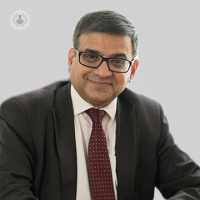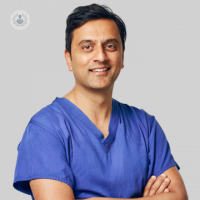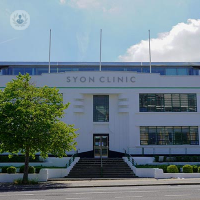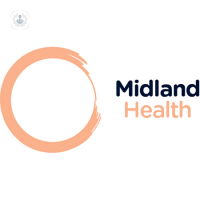What are polyps?
Polyps are abnormal tissue growths (clumps of cells) that appear as small bumps mostly on the inner lining of the large intestine (colon) or on the rectum (anus). It is also possible to develop polyps in the ear canal, cervix, stomach, nose, and uterus.
Some people may develop only one whilst others can develop two or more at a time. They can either be on a stalk and therefore have the appearance of a mushroom or appear much flatter and have a broad base.
Polyps are usually non-cancerous (benign) but in some cases, and if left undetected, they can eventually become cancerous (malignant). They are very common and it is unusual for them to occur in anyone below the age of 40. They most often occur in people over the age of 60.
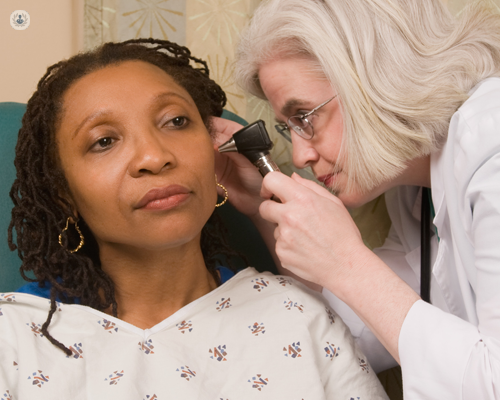
What are the symptoms of polyps?
The symptoms of the polyp depend on the location. Some of these may include:
- Ear canal – hearing loss, blood draining from the ear.
- Cervix – foul-smelling vaginal discharge, a heavier flow during periods, spotting between periods, bleeding after sexual intercourse.
- Colon – bleeding from the rectum, abdominal pain, a change in colour of stools, constipation or diarrhoea.
- Nose – a runny nose, persistent stuffiness, decrease or loss of sense of smell, a feeling of pressure over the forehead and face.
- Stomach – pain or tenderness in the abdomen, nausea, blood in the stool.
- Uterus – irregular menstrual bleeding, infertility, bleeding between periods, excessively heavy periods.
- Vocal cords – hoarseness, breathiness, a rough or scratchy voice.
- Bladder lining – constant or urgent need to urinate, pain in the abdomen, pain whilst urinating, blood in the urine.
What are the causes of polyps?
The causes of polyps depend on the location. Some known causes include a mutation in the genes of the cells, a cyst, a tumour, inflammation, chronic stomach inflammation and a foreign object.
Risk factors for polyps include smoking and drinking excessive alcohol, having a family history of polyps and cancer, obesity and conditions that are not managed well such as type 2 diabetes or Crohn’s disease.
How are polyps diagnosed?
The specialist will perform a physical examination and ask questions about your medical history. They will use imaging tests like X-rays, ultrasound or a CT scan to have a better look at the infected area.
If the doctor suspects that the polyp is cancerous, they may perform a biopsy. If the polyp is in the colon, a colonoscopy may be required to give the doctor a better image and they will be able to remove them.
How are polyps treated?
Not all polyps require treatment as they are benign and, for example, in cases of throat polyps, they typically go away on their own. Polyps may be surgically removed with a procedure called polypectomy to further prevent them from developing into cancer.
11-11-2013 11-01-2023Polyps
What are polyps?
Polyps are abnormal tissue growths (clumps of cells) that appear as small bumps mostly on the inner lining of the large intestine (colon) or on the rectum (anus). It is also possible to develop polyps in the ear canal, cervix, stomach, nose, and uterus.
Some people may develop only one whilst others can develop two or more at a time. They can either be on a stalk and therefore have the appearance of a mushroom or appear much flatter and have a broad base.
Polyps are usually non-cancerous (benign) but in some cases, and if left undetected, they can eventually become cancerous (malignant). They are very common and it is unusual for them to occur in anyone below the age of 40. They most often occur in people over the age of 60.

What are the symptoms of polyps?
The symptoms of the polyp depend on the location. Some of these may include:
- Ear canal – hearing loss, blood draining from the ear.
- Cervix – foul-smelling vaginal discharge, a heavier flow during periods, spotting between periods, bleeding after sexual intercourse.
- Colon – bleeding from the rectum, abdominal pain, a change in colour of stools, constipation or diarrhoea.
- Nose – a runny nose, persistent stuffiness, decrease or loss of sense of smell, a feeling of pressure over the forehead and face.
- Stomach – pain or tenderness in the abdomen, nausea, blood in the stool.
- Uterus – irregular menstrual bleeding, infertility, bleeding between periods, excessively heavy periods.
- Vocal cords – hoarseness, breathiness, a rough or scratchy voice.
- Bladder lining – constant or urgent need to urinate, pain in the abdomen, pain whilst urinating, blood in the urine.
What are the causes of polyps?
The causes of polyps depend on the location. Some known causes include a mutation in the genes of the cells, a cyst, a tumour, inflammation, chronic stomach inflammation and a foreign object.
Risk factors for polyps include smoking and drinking excessive alcohol, having a family history of polyps and cancer, obesity and conditions that are not managed well such as type 2 diabetes or Crohn’s disease.
How are polyps diagnosed?
The specialist will perform a physical examination and ask questions about your medical history. They will use imaging tests like X-rays, ultrasound or a CT scan to have a better look at the infected area.
If the doctor suspects that the polyp is cancerous, they may perform a biopsy. If the polyp is in the colon, a colonoscopy may be required to give the doctor a better image and they will be able to remove them.
How are polyps treated?
Not all polyps require treatment as they are benign and, for example, in cases of throat polyps, they typically go away on their own. Polyps may be surgically removed with a procedure called polypectomy to further prevent them from developing into cancer.
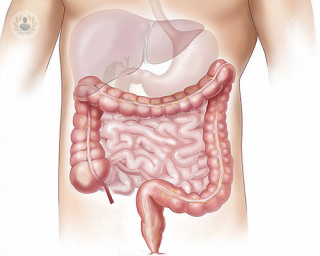

What are gallbladder polyps?
By Dr Charis Kyriakides
2024-11-21
Gallbladder polyps are growths that form on the inner lining of the gallbladder. Although most are benign, some gallbladder polyps may harbour malignancy. Here, Dr Charis Kyriakides, renowned consultant general and upper GI surgeon, offers his expert insight into gallbladder polyps. See more


TAMIS – a new approach in colorectal surgery
By Miss Sarah Mills
2024-11-21
Transanal minimally-invasive surgery (TAMIS) is a cutting-edge technique used to remove larger, more complex rectal polyps or early stages of rectal cancer. Ms Sarah Mills, a leading colorectal surgeon, explains how this procedure works, its success rate and the aftercare required following surgery. See more


Do uterine polyps need to be removed?
By Mr Mahantesh Karoshi
2024-11-21
For some women who have heavy periods every month or who bleed in between their next cycle, it can be really frustrating but could also be signs of a uterine polyp. Leading gynaecologist Mr Mahantesh Karoshi explains more about the excessive growths found in the uterine lining and whether they need to be removed. See more
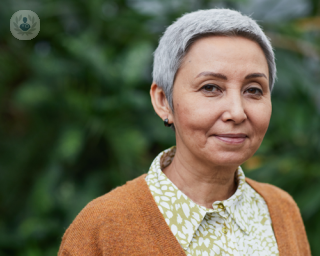

Postmenopausal bleeding: Your questions answered
By Mr Osama Naji
2024-11-21
Several health conditions can be indicated by postmenopausal bleeding (PMB) and it should receive specialist attention. We speak to Mr Osama Naji, a leading consultant gynaecologist based in Marylebone, London, all about PMB. He goes into expert detail about exactly what it is, how serious can be and how long it lasts, among other important issues. See more
Experts in Polyps
-
Dr Edward John Despott
GastroenterologyExpert in:
- Double balloon enteroscopy
- Endoscopy
- Colonoscopy
- Gastroscopy
- Capsule endoscopy
- Polyps
-
Mr Abhay Chopada
SurgeryExpert in:
- Polyps
- Bowel surgery
- Piles (haemorrhoids)
- Anal fistula
- Hiatal hernia surgery
- Colon cancer
-
Dr Karen Joash
Obstetrics & gynaecologyExpert in:
- Polycystic ovary syndrome (PCOS)
- Obstetric and gynecologic ultrasound
- Fibroids
- Polyps
- Heavy periods
- Hysterectomy
-
Mr Amyn Haji
Colorectal surgeryExpert in:
- Colorectal cancer
- Polyps
- Endoscopy
- Hernia
- Piles (haemorrhoids)
- Achalasia
-
Dr Debasis Majumdar
GastroenterologyExpert in:
- Endoscopy
- Colonoscopy
- Colon cancer
- Polyps
- ERCP
- Iron deficiency
- See all

Shirley Oaks Hospital - part of Circle Health Group
Shirley Oaks Hospital - part of Circle Health Group
Poppy Lane, Croydon CR9 8AB
No existe teléfono en el centro.
By using the telephone number provided by TOP DOCTORS, you automatically agree to let us use your phone number for statistical and commercial purposes. For further information, read our Privacy Policy
Top Doctors

Syon Clinic - part of Circle Health Group
Syon Clinic - part of Circle Health Group
941 Great West Rd, Brentford TW8 9DU
No existe teléfono en el centro.
By using the telephone number provided by TOP DOCTORS, you automatically agree to let us use your phone number for statistical and commercial purposes. For further information, read our Privacy Policy
Top Doctors

Midland Health Birmingham
Midland Health Birmingham
Midland Health, 23a Highfield Road
No existe teléfono en el centro.
By using the telephone number provided by TOP DOCTORS, you automatically agree to let us use your phone number for statistical and commercial purposes. For further information, read our Privacy Policy
Top Doctors
-
Shirley Oaks Hospital - part of Circle Health Group
Poppy Lane, Croydon CR9 8AB, South LondonExpert in:
- General Surgery
- Orthopaedic surgery
- Plastic surgery, reconstructive and aesthetics
- Gastroenterology
- Obstetrics and Gynaecology
- Neurosurgery
-
Syon Clinic - part of Circle Health Group
941 Great West Rd, Brentford TW8 9DU, West LondonExpert in:
- Allergies nose and ears
- Allergy Dermatitis
- Allergy
- Clinical analysis
- Anxiety
- Digestive
-
Midland Health Birmingham
Midland Health, 23a Highfield Road, EdgbastonExpert in:
- Diagnostic Imaging
- Pregnancy
- Women’s health
- General practice
- Menopause
- Sexual health
- See all
- Most viewed diseases, medical tests, and treatments
- PGT-A
- PGT-M
- Ovulatory disorders
- Fertility preservation
- Tubal factor infertility
- Female infertility
- Surrogacy
- Menopause support
- Hormone therapy
- Pelvic ultrasound
